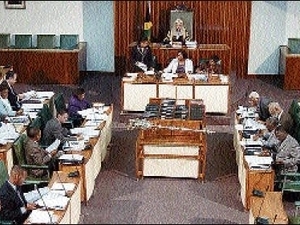
The Jamaica Labour Party Manifesto 2007 contains a message from the leader in which he states that the manifesto "represents our commitment to the Jamaican people and is reinforced by our 100-Day Covenant which sets out the specific initiatives we intend to take within the first 100 days to demonstrate the strength of our commitment".
Those 100 days have long gone, since December of last year, and it is not immediately apparent what parliamentary activities the Jamaican people can point to as "the specific initiatives" that have as yet been taken to "demonstrate the strength" of the commitment of the administration.
One thing is certain: a great deal of time has been wasted. For example, the swearing-in ceremony for the present Senate was held on September 27 last year, some 56 weeks ago.
meeting record
Apart from that meeting, the Upper House has met only 26 times - less than once in every two weeks in more than a one-year period. That must be a record.
And it gets worse. Of the 26 times that the Senate has met, there have been 10 sittings of less than one hour in duration, four of which were for a period of 16 minutes or less; six meetings of less than two hours; four of less than three hours; five of less than four hours; and one which lasted for exactly four hours.
The only real debate on any bill had to do with the prime minister's pension, a matter which, in effect, did not require legislation. For, if the prime minister was not moved to accept the arrangements that were in place, all he had to do, upon retirement, was to pass on that portion that he did not wish to accept to a charity of his choice, or simply refuse to take it.
There was much that could have been accomplished during those several weeks and months during which the Senate has been idle. The conscience vote debate on capital punishment, which has been promised, could easily have already taken place in the Upper House.
In fact, it might have been the appropriate procedure to have adopted, since the members are not tied to constituencies and could also, for the benefit of the public, have laid out the broad landscape of the issues involved before the members of the House of Representatives came to have their say.
Again, had there been a debate on the recommendations relating to sexual offences that had been made in a report of a joint select committee and tabled in June of last year, a great deal of time would have been saved. The officials who would eventually come to draft the bill would have been seized of the matters that Parliament would have already accepted. There was a stubborn refusal to follow that logical route.
Further, the opening of the State of the Nation Debate was on June 20, this year; eight senators from both sides have made contributions. Some 16 weeks have passed and none of the four Cabinet members has chosen to share with us and the rest of the nation; and yet, the Senate has met only seven times since the beginning of the debate in June.
first chapter
The first chapter of the Jamaica Labour Party Manifesto is entitled: 'A framework for good governance'. To save further precious time, there are at least two 'pledges' made in that chapter which, with respect, ought to be abandoned, for they do not sit well with the structure of our constitutional arrangements.
These are:
Fixed election period: Establish a fixed election period subject to variation only in specified circumstances.
Term limits: Impose a two-term limit on anyone holding the office of prime minister.
For some time before the publication of that manifesto, there was an exchange of views within the wider society on the question of a fixed date for general elections. As I recall, this was an initiative which was proposed to be implemented during "the first 100 days".
As far as the efficacy of that proposal is concerned, I have said before that those who support a fixed date are inclined to argue that this is consistent with good organisation, and that the alternative Westminster-style approach gives an advantage to the incumbent government.
Because the power to determine the date is expressly given to the prime minister, the argument is that the prime minister will ensure that the governing side is ready before the elections are called.
This viewpoint is sometimes reinforced by reference, for instance, to Barnett, who wrote the following in The Constitutional Law of Jamaica:
"The Prime Minister is thus able to select the moment for a dissolution which he considers most favourable to the electoral prospects of his office, and by virtue of his control of the machinery of Government, he can engineer the creation of these favourable circumstances as, for instance, by employing the publicity agencies of Government to direct special attention to the most successful sections of Government's activities and by seeing to the implementation of such schemes as will conduce to popular enthusiasm for office administration" (at pages 91 to 92).
Of course, it is possible that the variable date gives an advantage to the prime minister; and, to be sure, within that system, the prime minister would be expected to put the government's best foot forward in the democratic race for election.
But such considerations can be counterbalanced by certain factors; and, though it may be superficially attractive, there are substantial disadvantages to the fixed date argument.
First, the fixed term system lacks flexibility, as the authorities in Canada recently had to contemplate. In some cases, there may be good reason for the prime minister to call general elections before the end of the full term. The Government may, for example, need a fresh mandate to embark upon a substantial programme of reform of a certain type.
Again, the prime minister may wish a mandate to make changes within the party that forms the Government.
Such changes can readily be accommodated in the practices that are employed in the current system, but not in the fixed term arrangement. And it is no response to suggest that the fixed term system may have exceptions; for once exceptions are contemplated, the governing party would still have the upper hand in the determination of the election date, by bringing itself within one of those exceptions.
Second, the variable date approach exists within the Westminster system as part of a set of rules that have hallowed vintage. Naturally, the vintage does not necessarily indicate that the rule is good, although it is to be noted that the system has worked throughout the Caribbean and most of the Commonwealth, with only occasional challenges.
Westminster system
More important, the Westminster system allows the Opposition to bring 'no confidence' motions in the hope of changing the Government - a facility that ensures vigilance on the part of government.
Third, the prime minister's power to call snap elections helps to keep parliamentarians on both sides on their toes. If everyone knows that elections are to be called on a fixed date, some parliamentarians may well be inclined to leave the difficult, hard side of governing and opposition to the last minute. There would be even more complaints about absentee politicians.
The pledge made by the prime minister and his team for a fixed election period to be established should therefore be abandoned and our people exhorted to deal with the agreed positions that have been arrived at in relation to the reform of our constitutional arrangements.
There is also the proposal to impose a two-term limit on anyone holding the office of prime minister. This suggestion should be approached with caution. In its favour, there is the argument based on youth, enthusiasm and energy.
But, in response, we should note that in the current arrangements, youth may make their way into the system and, more significantly, a party that disregards youth will systematically exclude an extremely important element of the electorate. If the party disregards the youth, the youth will disregard the party.
enthusiasm and energy
Likewise, as to enthusiasm and energy, it should be noted that the argument is a non sequitur. There is no clear proof that a new prime minister or new members of Parliament, simply by virtue of being new, come to their tasks with any greater energy than those who have served before them.
Of course, some may become jaded after repeated terms of office, but others may not, and if persons do become jaded, it is open to the electorate to vote them out.
Moreover, even if it is accepted that a new prime minister or new parliamentarians are apt to have high energy levels, there will always be the counter-argument based on experience. Those who have already served two terms in office or in Parliament may well have a grasp of the issues, and the institutional memory, to guide policy and legislation with greater skill and maturity than persons who are starting afresh.
This perspective is necessarily tentative, for one should not wish to overgeneralise; but it appears to be quite appropriate to leave it to the voters to decide whether an individual deserves an additional term.

A Senate sitting in session.- Junior Dowie/Staff Photographer
preferred approach
In my view, in the Westminster-style system that we adhere to, this should be the preferred approach. It cannot be argued that it is undemocratic, since it allows the people to decide whether they wish a prime minister or representative to be retained. It certainly closes off the accusation that term limits actually discriminate against individuals because they have successfully represented their constituents, or against prime ministers who have served with distinction.
Good governance and the constitutional reform agenda require some industry to be displayed by the administration. Several agreements have long been arrived at. The Senate should not be idle.
A.J. Nicholson is opposition spokesman on justice. Feedback may be sent to columns@gleanerjm.com.